Dexi Liu
MADP: Multi-Agent Deductive Planning for Enhanced Cognitive-Behavioral Mental Health Question Answer
Jan 27, 2025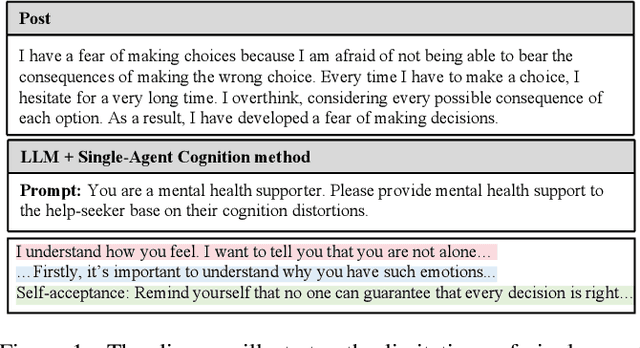
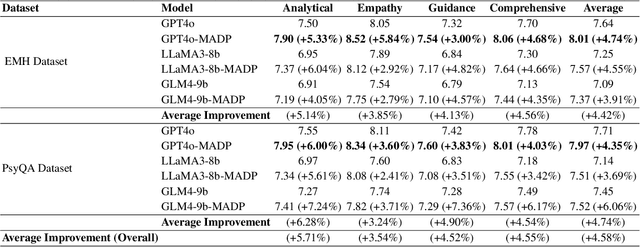

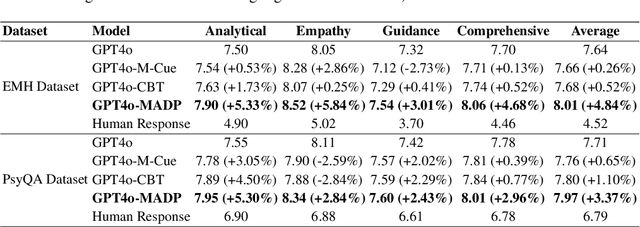
Abstract:The Mental Health Question Answer (MHQA) task requires the seeker and supporter to complete the support process in one-turn dialogue. Given the richness of help-seeker posts, supporters must thoroughly understand the content and provide logical, comprehensive, and well-structured responses. Previous works in MHQA mostly focus on single-agent approaches based on the cognitive element of Cognitive Behavioral Therapy (CBT), but they overlook the interactions among various CBT elements, such as emotion and cognition. This limitation hinders the models' ability to thoroughly understand the distress of help-seekers. To address this, we propose a framework named Multi-Agent Deductive Planning (MADP), which is based on the interactions between the various psychological elements of CBT. This method guides Large Language Models (LLMs) to achieve a deeper understanding of the seeker's context and provide more personalized assistance based on individual circumstances. Furthermore, we construct a new dataset based on the MADP framework and use it to fine-tune LLMs, resulting in a specialized model named MADP-LLM. We conduct extensive experiments, including comparisons with multiple LLMs, human evaluations, and automatic evaluations, to validate the effectiveness of the MADP framework and MADP-LLM.
DEGAP: Dual Event-Guided Adaptive Prefixes for Templated-Based Event Argument Extraction Model with Slot Querying
May 22, 2024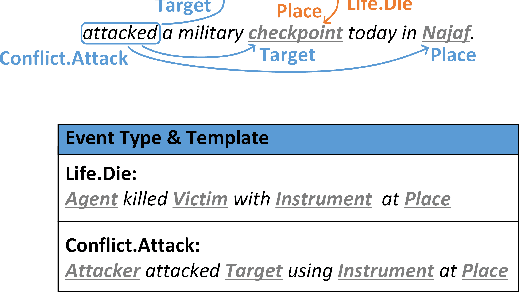
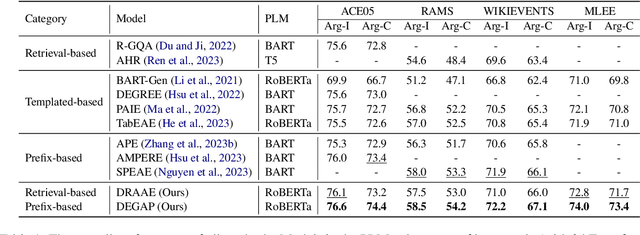
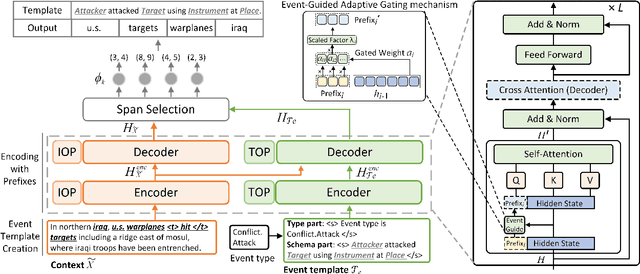
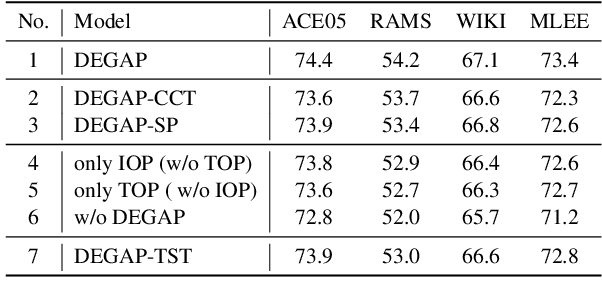
Abstract:Recent advancements in event argument extraction (EAE) involve incorporating beneficial auxiliary information into models during training and inference, such as retrieved instances and event templates. Additionally, some studies introduce learnable prefix vectors to models. These methods face three challenges: (1) insufficient utilization of relevant event instances due to deficiencies in retrieval; (2) neglect of important information provided by relevant event templates; (3) the advantages of prefixes are constrained due to their inability to meet the specific informational needs of EAE. In this work, we propose DEGAP, which addresses the above challenges through two simple yet effective components: (1) dual prefixes, where the instance-oriented prefix and template-oriented prefix are trained to learn information from different event instances and templates, respectively, and then provide relevant information as cues to EAE model without retrieval; (2) event-guided adaptive gating mechanism, which guides the prefixes based on the target event to fully leverage their advantages. Extensive experiments demonstrate that our method achieves new state-of-the-art performance on four datasets (ACE05, RAMS, WIKIEVENTS, and MLEE). Further analysis verifies the importance of the proposed design and the effectiveness of the main components.
Dynamic Strategy Chain: Dynamic Zero-Shot CoT for Long Mental Health Support Generation
Aug 21, 2023Abstract:Long counseling Text Generation for Mental health support (LTGM), an innovative and challenging task, aims to provide help-seekers with mental health support through a comprehensive and more acceptable response. The combination of chain-of-thought (CoT) prompting and Large Language Models (LLMs) is employed and get the SOTA performance on various NLP tasks, especially on text generation tasks. Zero-shot CoT prompting is one of the most common methods in CoT prompting. However, in the LTGM task, Zero-shot CoT prompting can not simulate a counselor or provide personalized strategies without effective mental health counseling strategy prompts. To tackle this challenge, we propose a zero-shot Dynamic Strategy Chain (DSC) prompting method. Firstly, we utilize GPT2 to learn the responses written by mental health counselors and dynamically generate mental health counseling strategies tailored to the help-seekers' needs. Secondly, the Zero-shot DSC prompting is constructed according to mental health counseling strategies and the help-seekers' post. Finally, the Zero-shot DSC prompting is employed to guide LLMs in generating more human-like responses for the help-seekers. Both automatic and manual evaluations demonstrate that Zero-shot DSC prompting can deliver more human-like responses than CoT prompting methods on LTGM tasks.
Chinese Financial Text Emotion Mining: GCGTS -- A Character Relationship-based Approach for Simultaneous Aspect-Opinion Pair Extraction
Aug 04, 2023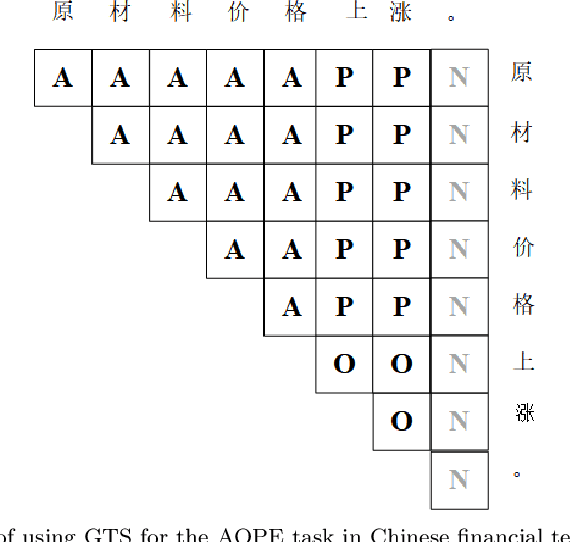

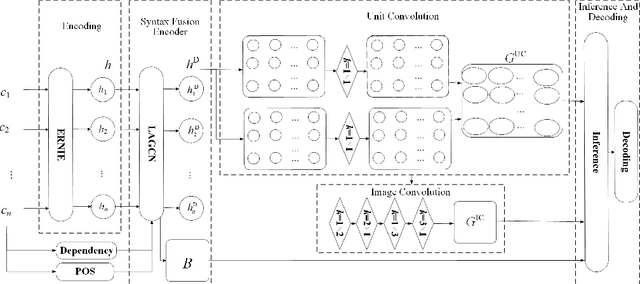
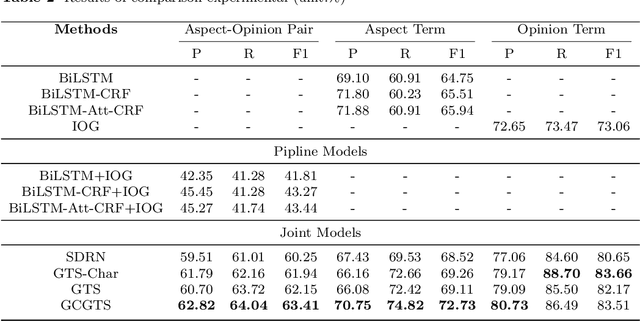
Abstract:Aspect-Opinion Pair Extraction (AOPE) from Chinese financial texts is a specialized task in fine-grained text sentiment analysis. The main objective is to extract aspect terms and opinion terms simultaneously from a diverse range of financial texts. Previous studies have mainly focused on developing grid annotation schemes within grid-based models to facilitate this extraction process. However, these methods often rely on character-level (token-level) feature encoding, which may overlook the logical relationships between Chinese characters within words. To address this limitation, we propose a novel method called Graph-based Character-level Grid Tagging Scheme (GCGTS). The GCGTS method explicitly incorporates syntactic structure using Graph Convolutional Networks (GCN) and unifies the encoding of characters within the same syntactic semantic unit (Chinese word level). Additionally, we introduce an image convolutional structure into the grid model to better capture the local relationships between characters within evaluation units. This innovative structure reduces the excessive reliance on pre-trained language models and emphasizes the modeling of structure and local relationships, thereby improving the performance of the model on Chinese financial texts. Through comparative experiments with advanced models such as Synchronous Double-channel Recurrent Network (SDRN) and Grid Tagging Scheme (GTS), the proposed GCGTS model demonstrates significant improvements in performance.
Token-Event-Role Structure-based Multi-Channel Document-Level Event Extraction
Jun 30, 2023



Abstract:Document-level event extraction is a long-standing challenging information retrieval problem involving a sequence of sub-tasks: entity extraction, event type judgment, and event type-specific multi-event extraction. However, addressing the problem as multiple learning tasks leads to increased model complexity. Also, existing methods insufficiently utilize the correlation of entities crossing different events, resulting in limited event extraction performance. This paper introduces a novel framework for document-level event extraction, incorporating a new data structure called token-event-role and a multi-channel argument role prediction module. The proposed data structure enables our model to uncover the primary role of tokens in multiple events, facilitating a more comprehensive understanding of event relationships. By leveraging the multi-channel prediction module, we transform entity and multi-event extraction into a single task of predicting token-event pairs, thereby reducing the overall parameter size and enhancing model efficiency. The results demonstrate that our approach outperforms the state-of-the-art method by 9.5 percentage points in terms of the F1 score, highlighting its superior performance in event extraction. Furthermore, an ablation study confirms the significant value of the proposed data structure in improving event extraction tasks, further validating its importance in enhancing the overall performance of the framework.
 Add to Chrome
Add to Chrome Add to Firefox
Add to Firefox Add to Edge
Add to Edge